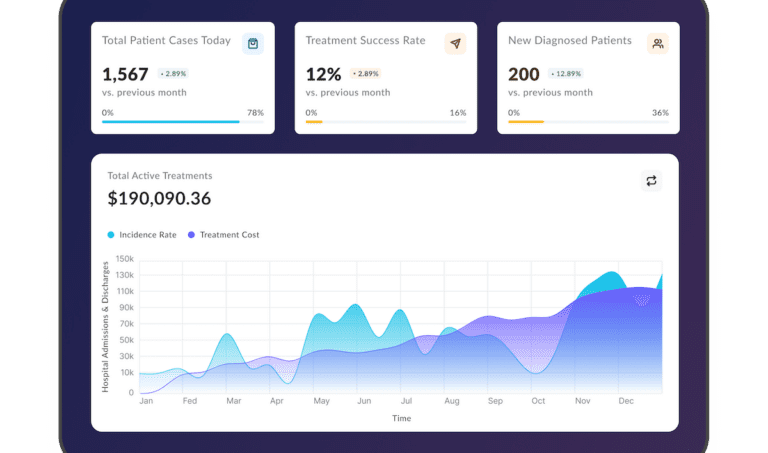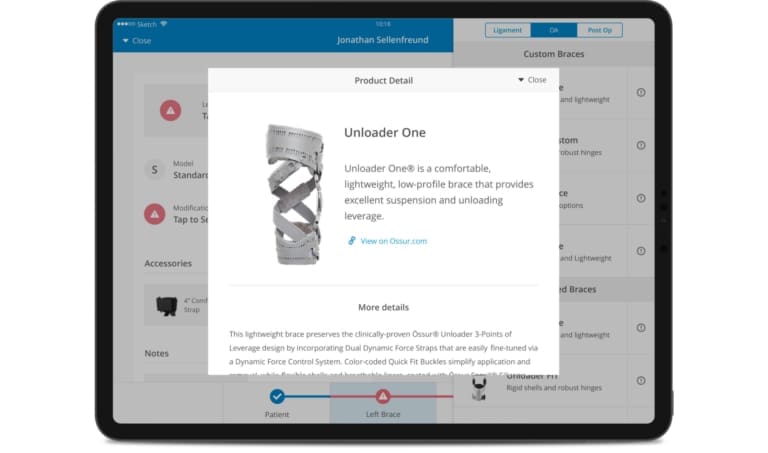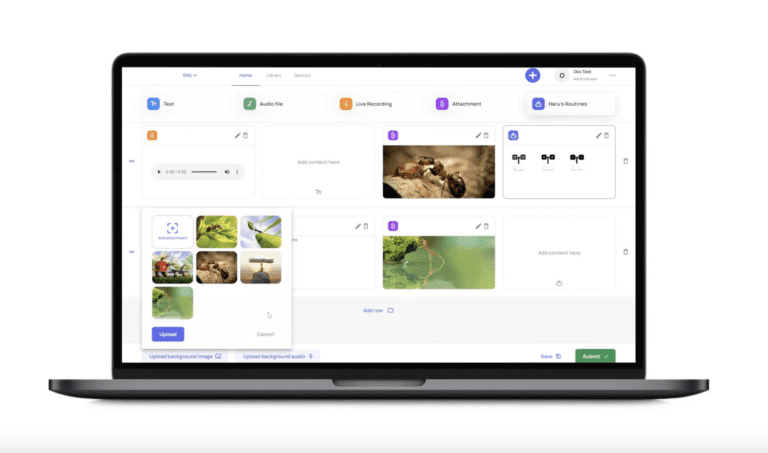Ultimate Guide to AI in Insurance Software: Benefits, Use Cases, and Key Technologies
Updated: June 4, 2025
Although insurance companies have always been surrounded by a wealth of data, they have not always used it to its full potential until now. The introduction of AI in insurance software, which processes and learns from huge sets of information has changed a lot. In particular, artificial intelligence has shown that data can be used to drive performance, personalize policies, and serve customers better.
As someone who has been developing AI solutions for over a decade, we can say that integrating AI in insurance is achievable for every business, and it’s worth trying your hand at. If you’re interested in finding out more about why artificial intelligence deserves your attention and how it can boost your business, keep reading.

We provide companies with senior tech talent and product development expertise to build world-class software. Let's talk about how we can help you.
Contact usTable of Contents
AI in Insurance: An Overview
In the not-so-distant past, insurance companies were traditionally associated with endless paperwork and lengthy waiting times for claim decisions. AI in insurance software is radically changing the game. There are dozens of processes that artificial intelligence can greatly improve: detecting fraud, assessing risks, optimizing claims, and so much more.
According to Forbes, the insurance industry has witnessed a 60% enhancement in operational efficiency, coupled with a near-perfect 99.99% boost in claims accuracy and a 95% advancement in customer experience, all thanks to AI-based solutions. Recognizing the value innovation technology can bring, 74% of insurance executives increased their investments in creating AI systems.
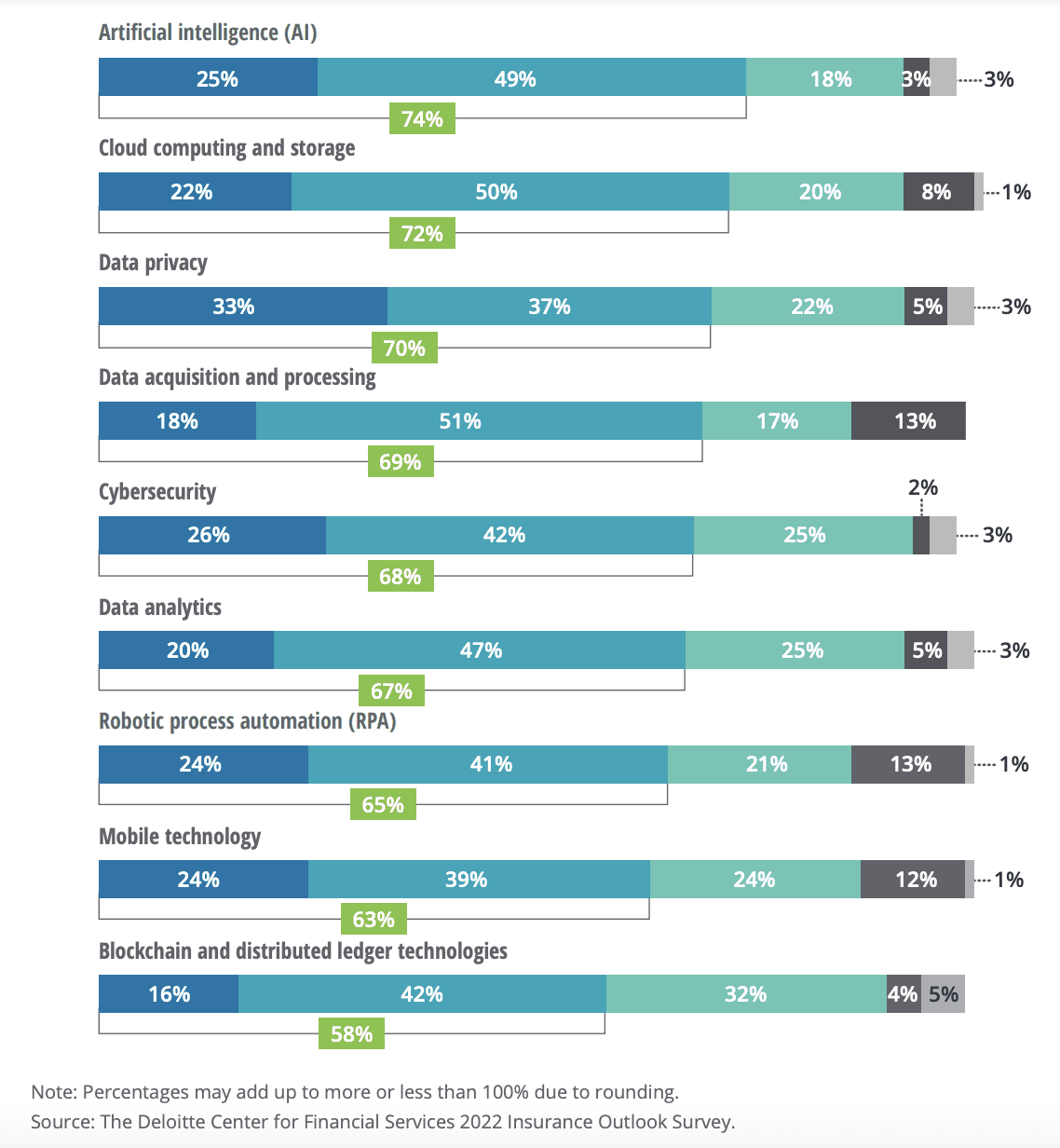
Source: Deloitte
AI in the insurance industry equips operators with the tools that help solve current and upcoming challenges of regulatory requirements and rising labor costs. Along with that, Insurance companies that leverage AI are more prepared to meet customer expectations and compete with tech-savvy InsurTech newcomers.
Key Technologies AI in Insurance Software
Artificial intelligence can add value only when done correctly. For this, you should understand the core technologies working behind AI processes that teach machines to see, understand, make decisions, and learn pretty much like people do.
Machine Learning and Predictive Analytics
As a subset of AI capable of uncovering hidden patterns and relationships within data, machine learning in insurance has become a game-changer for risk assessment. Before, insurers made assessments mostly based on limited and often inaccurate historical data and broad policyholder categorization. Today, they can use ML-powered and predictive analytics software to forecast an applicant’s likelihood of making a claim and create more personalized risk profiles that better correspond to reality.
Such software takes into account health history, lifestyle, driver’s license, credit score and other important factors to more accurately calculate insurance premiums based on actual risk. So, insurers can customize policies and offer more competitive rates for low-risk policyholders and charge high-risk ones more.
Natural Language Processing (NLP)
NLP is another sub-technology of AI widely used in the insurance sector to improve customer service and claim processing.
As a rule, more than half of the time, customer service interactions consist of responding to basic questions that can be easily found on the website. That’s where even the simplest chatbot or conversational artificial intelligence in insurance powered by NLP can make the difference. Insurers can use them to answer frequently asked questions, provide details about policies, or guide clients on how to complete certain processes. Chatbots don’t need breaks and can handle multiple queries at once, freeing up your staff to focus on more complex tasks.
When it comes to claims processing, the same chatbots can guide policyholders to take photos and videos of the damage and convert it instantly into a first notice of loss (FNOL). And NLP-driven optical character recognition (OCR) model can quickly sift through and derive relevant info from claim forms, FNOLs, and even handwritten notes. This way, insurers can automate the whole claims processing.
Robotics Process Automation (RPA)
artificial intelligence in insurance comes in many forms, and one of them is robotics. RPA tools are designed to automate repetitive tasks like customer information collection, data entry, extraction, and verification. As a result, insurance companies increase efficiency and productivity, reducing the workload on employees and freeing up their time for more value-added tasks.
Some of the ways RPA solutions can help you with:
- Transferring data between different applications
- Collecting information from emails into a central system
- Extracting data for and executing calculations for reports
- Sending standard reminders and information inquiries
Benefits of AI in Insurance Software
AI tools help insurers process immense volumes of data from multiple sources in a fraction of the time required to do it manually and make complex predictions every day. So, strategically, adopting AI in insurance software can be highly beneficial to both insurers and customers. Here are some of the most appealing benefits of artificial intelligence in insurance you can reap:
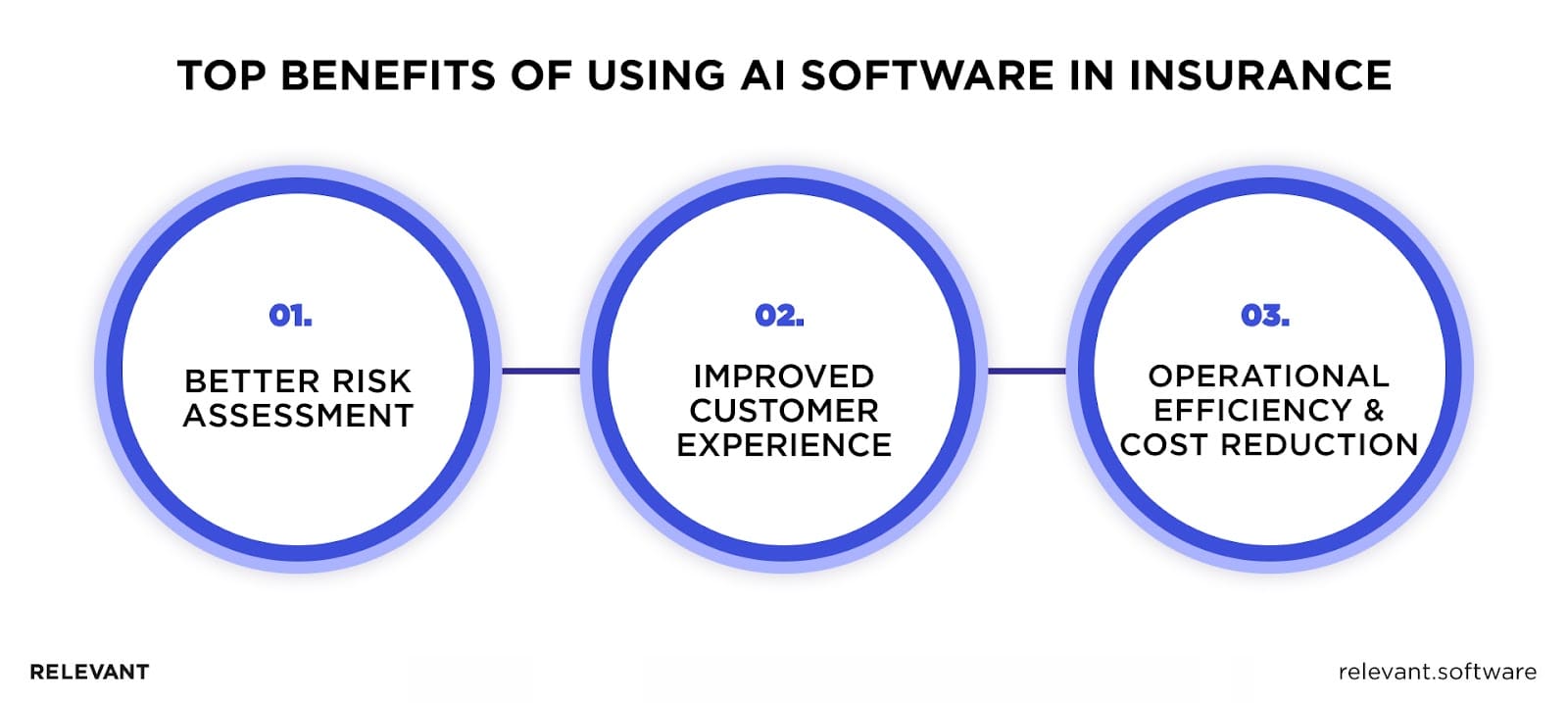
- Enhanced Risk Assessment. The use of AI in insurance lets providers make more accurate risk evaluations. AI-powered software spots the tiniest patterns and correlations in large data sets that can influence risk assessments. As a result, insurers can offer fairer pricing based on actual risk factors and make smarter underwriting decisions.
- Improved Customer Experience. Other benefits of artificial intelligence in insurance workflows are personalized, faster, and more convenient customer experiences. Instant responses to queries or complaints, automated with chatbots and customized policy suggestions, will keep your customers satisfied and more loyal.
- Operational Efficiency and Cost Reduction. Robotic process automation, chatbots, and machine learning for insurance can all speed up processes and take time-consuming activities out of your staff’s work agenda. Automated claims management and responses to customer inquiries through AI in insurance software save precious time and reduce operational costs. Also, optimized policy underwriting helps companies set better prices and lower the risk of costly payouts.
Use Cases of AI in Insurance Software
McKinsey estimates that investing in AI applications in insurance can drive up to $1.1 trillion in annual value for the industry. So, what are those billion-dollar AI use cases in insurance? Here are the main applications we see today.
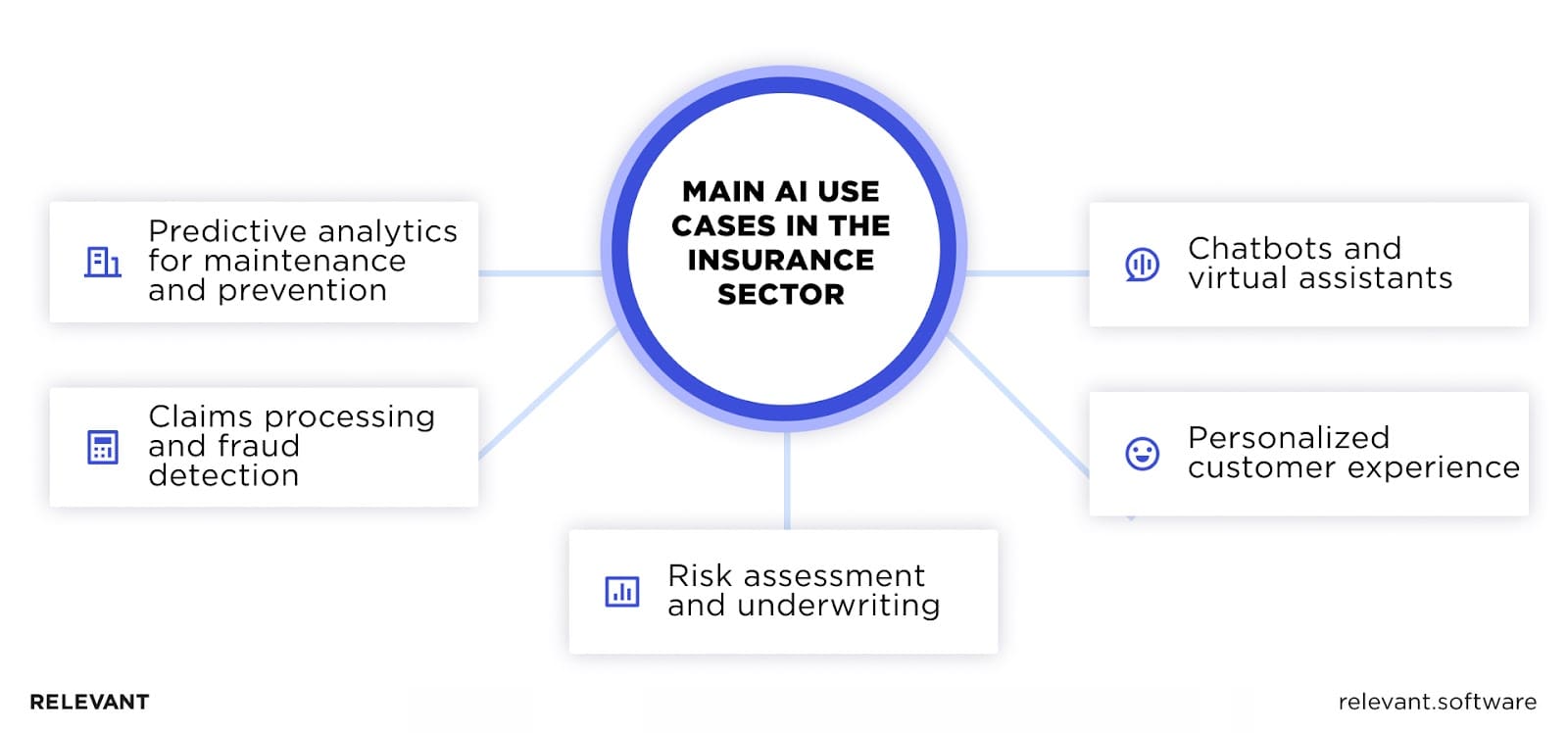
Risk Assessment and Underwriting
The manual underwriting process, which requires deep research of customer risk profiles to evaluate risk, is prone to errors, is time-consuming, and can possibly result in inefficient pricing. What’s more, it heavily relies on data that applicant provides by filling up forms manually. But sometimes, people make mistakes or aren’t totally honest, which may lead to less-than-accurate risk assessment. This is why artificial intelligence in insurance is the perfect fit for risk pricing and underwriting.

The integration of AI in insurance software improves both the accuracy and efficiency of risk pricing. First, it can consider multiple factors, from medical records to weather and economic conditions, to calculate potential risk probabilities. Second, ML and AI in insurance help insurers pull out relevant information from documents, further streamlining the process. From chatbots to RPA, artificial intelligence solutions let companies handle operations more quickly and profitably.
Here are key ways insurance providers can improve underwriting using AI:
- Application Processing. RPA automates data collection, extraction, form filling, and other repetitive activities.
- Risk Assessment. AI and ML models, along with other analytical tools, allow for a deeper analysis of customer risk profiles.
- Customer Experience. AI in the insurance sector dramatically shortens underwriting timeframes, meeting consumer demands for real-time service.
- Profitability. AI automation increases underwriting profitability while lowering operational expenses and minimizing customer turnover.
Claims Processing and Fraud Detection
Today, people expect digital and on-demand claim submission and processing. So, most insurance carriers now offer such an option using AI-based assistants to guide customers through the claim process. They can review claims, check policy details, and even assess whether the claim is fraudulent almost instantly before initiating claim settlements. This streamlined way of handling claims improves operational efficiency and delivers a smooth customer experience.

Considering the FBI’s finding that insurance fraud, excluding health insurance, costs over $40 billion yearly in the U.S. alone, it’s a big pressure on insurance companies. Not only insurers who are financially impacted by fraud, but it also burdens customers with higher premiums, creating a lose-lose situation.
One of the promising AI use cases in insurance is fraud prevention. NLP and ML models can analyze previous fraudulent applications to find similar characteristics in submitted claims or spot anomalies that can indicate fraud. This tool can also be useful for investigative procedures, saving time by classifying the documents.
Personalized Customer Experience
Customers today don’t just hope for – they expect – policies and offers crafted precisely to their preferences. That’s where AI in insurance software becomes a solution that delivers a truly personalized experience tailored to each individual’s lifestyle and needs.

By analyzing customer data – from past interactions to policy details and personal preferences – AI figures out what each customer really needs. With such ML systems trained on individual customer data, insurers can offer personalized insurance plans and special loyalty programs that will increase customer retention and upselling. On top of that, ML tools can anticipate your clients’ needs before they even voice them and offer services and recommendations that feel just right.
In an insurance world where one size fits all is no longer the norm, providers offering a service that’s unique for each of their customers is a big differentiating factor. At the end of the day, making clients satisfied is the goal of every business.
Predictive Analytics for Maintenance and Prevention
Insurance professionals have to deal with mitigating losses in different situations. Predictive analytics is changing the rules, allowing providers to protect policyholders from costly damages. Smart ML-powered systems keep an eye on the little things that might lead to bigger problems.
Predictive analytics in auto insurance, for example, can provide recommendations to drivers about vehicle maintenance. It examines patterns in vehicle usage data to predict potential failures that might occur. Constant monitoring and suggestions to check car brakes or engines can save your customers from accidents and expensive repairs and insurers from costly claims.
There are also some AI use cases in health insurance. The technology helps identify early signs of health issues and recommend a lifestyle change or a check-up for your policyholders.
For insurance companies, this means a shift from payouts for losses to investments in prevention. By doing so, your customers avoid the stress and disruption of unexpected mishaps, and you reduce costly claims.
Chatbots and Virtual Assistants
Insurance providers are increasingly turning to chatbots to support their customer service, accelerate response times, and save costs. These virtual assistants swiftly resolve simple customer queries, saving your staff time to deal with more complex tasks and improving their productivity. Let’s picture a situation to better understand the bot in action.
Imagine a customer, let’s call her Sarah, who’s just been in a minor car accident. She’s shocked and needs to start her claim process. Instead of waiting in a phone queue, she interacts with a chatbot. This AI-driven assistant not only guides Sarah through the claim submission process but also answers her questions on the spot – everything from policy coverage to the next steps.

Artificial intelligence in insurance can enhance each aspect of your business, including customer loyalty, brand image, online engagement, and revenue generation. When implemented correctly, insurers can leverage AI’s capabilities to the fullest – from data collection to speech recognition. And enjoy the benefits of round-the-clock, multi-channel customer support that delights their clients and reduces operational costs.
Here are the main ways chatbots improve customer service:
- Resolving FAQs
- Learning customer behavior
- Speeding up response times
- Faster and more accurate problem resolution thanks to NLP
How Relevant Can Help Your Business To Utilize AI Effectively
As we can already see the huge impact of artificial intelligence in insurance, we can safely say that the future of insurance will be further shaped by this technology. Those embracing AI in insurance software are already reaping the benefits in the form of reduced costs, optimized processes, improved profitability, and loyal customers who renew their policies. So, probably, it’s time to make the move.
But where do you start? The key is to find the right expertise to bring these AI solutions to life. Relevant Software can help you support your efforts and harness the benefits of automation. Our team of skilled AI engineers can build custom AI solutions that will help you stay ahead of the curve.
Our core services:
Do you want a price estimate for your project?
Do you know that we helped 200+ companies build web/mobile apps and scale dev teams?
Let's talk about your engineering needs.
Write to us